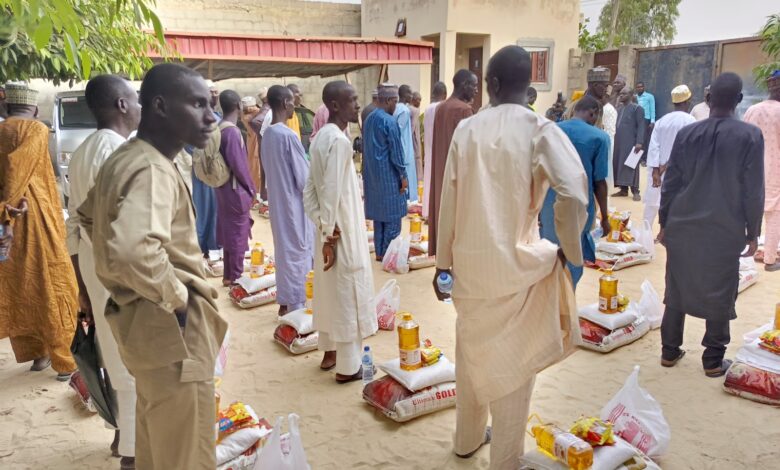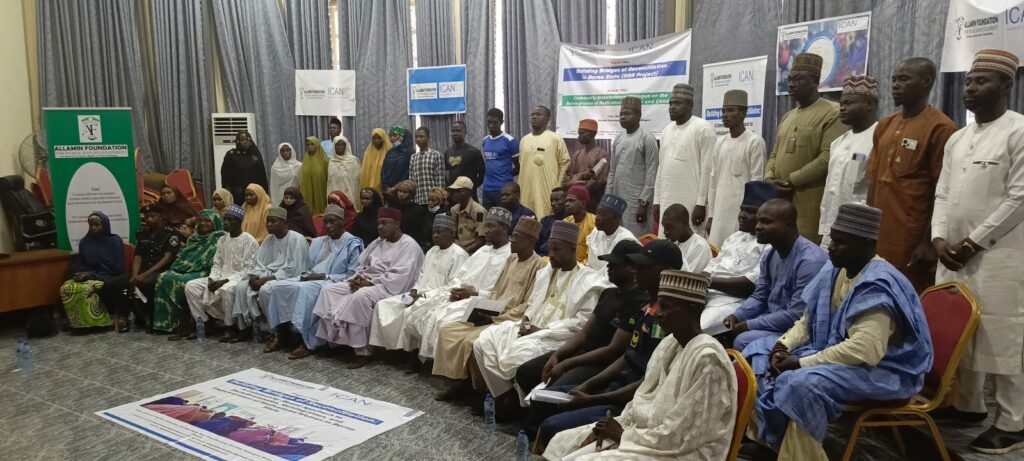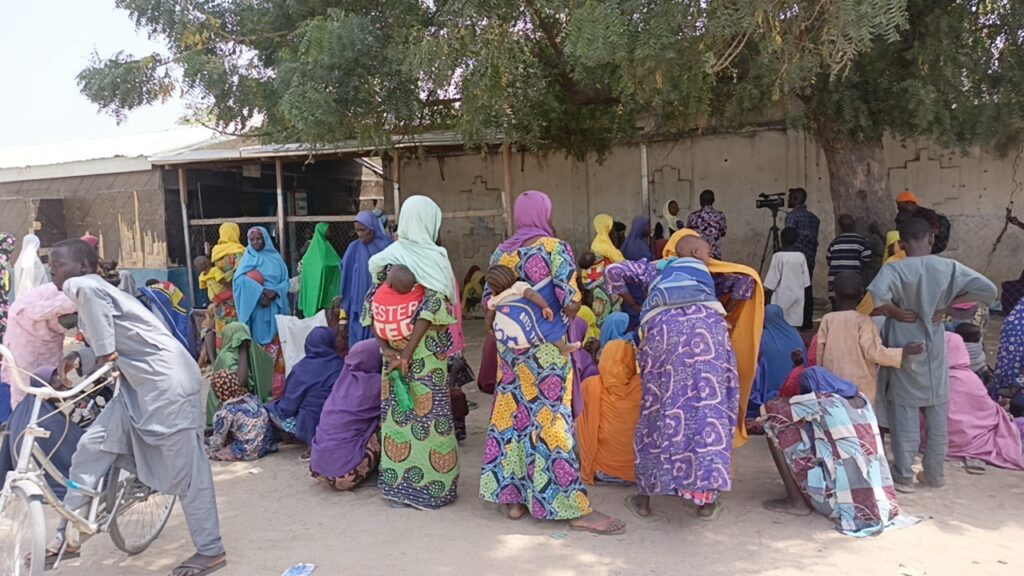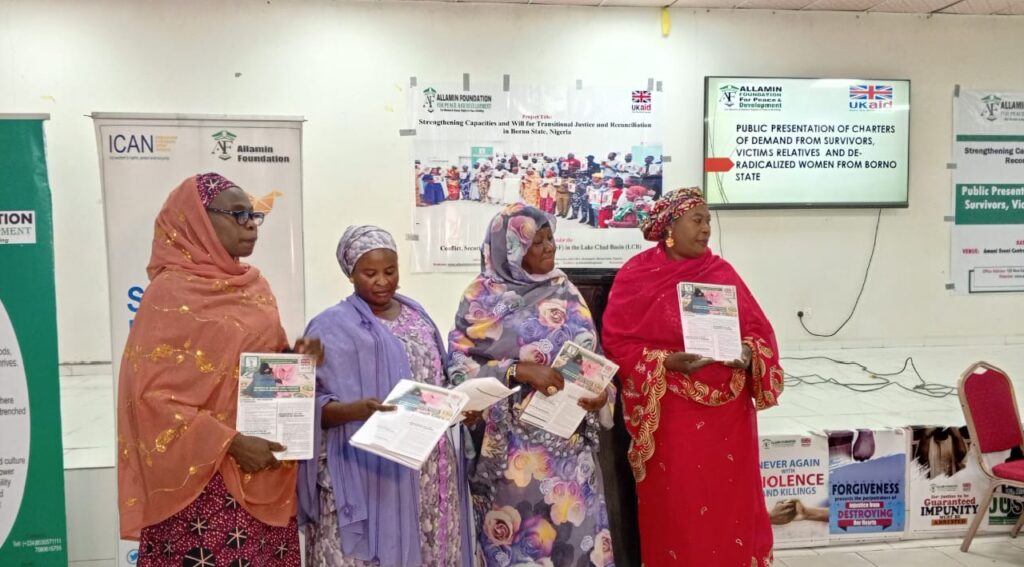From ‘Enemies’ To Neighbours: Borno’s Bumpy Peacebuilding Journey
The Borno state government's initiative to reintegrate former Boko Haram terrorists militants into the communities they previously attacked has stirred a wide range of responses. While there are reasons to doubt its effectiveness in some places, there are also promising developments.

On a sweltering day on the outskirts of Maiduguri, Borno state, northeastern Nigeria, two uniformed young men were stopped by officials from the Nigeria Drug Law Enforcement Agency (NDLEA).
The men, who claimed to be former Boko Haram fighters now working as a hybrid support force for the Nigerian military, were unhappy that the drug officials did not respect their new identity. They tried to assert their ‘immunity’ from what they considered a routine security operation. An NDLEA official reportedly made a derogatory remark about a group of individuals supposedly being pampered by the government instead of receiving punishment for the heinous crimes they had committed against the state. Tensions escalated quickly, leading to a brawl. The NDLEA then overpowered the men and invited the police to arrest them. Words reached their associates, other Boko Haram deserters, at the Chabbal rehabilitation camp, who then stormed the NDLEA post.
Upon the arrival of the vexed group on Wednesday, May 1, the NDLEA personnel took to their heels. The angry former Boko Haram fighters destroyed the NDLEA post. From there, they headed to a police station, which they learned was holding their colleagues. The police had to release canisters of tear gas to prevent the invasion.
The police in Borno issued a statement that it had apprehended eight former Boko Haram members who attacked the NDLEA post — a statement it would later deny following a reprimand from the government.
This incident illustrates some of the complications that have met the Borno state government’s efforts to reintegrate over 80,000 insurgents and their families who have surrendered following the death of Boko Haram leader Abubakar Shekau in May 2021.
The government’s initiative to reintegrate these former militants into the communities they previously devastated has stirred a wide range of responses.
In the Marte local government area, this reporter obtained a verified report about two ‘repentant’ Boko Haram members who had returned to the community where they had previously committed heinous acts of violence. The military personnel in charge of the area urged the community leaders to forgive and accept the former terrorists in the interest of peace, a request that the residents eventually agreed to.
However, days later, the two ex-terrorists went missing.
A young man who preferred to remain anonymous revealed, “Some of the community members trailed them to their homes at night and executed the same brutal acts they had inflicted on our parents years ago. They had dragged many of our brothers and parents to the riverside, beheaded them, and disposed of their bodies in the river.”
Many other deserters have also had to grapple with rejection and stereotyping.
“When our children attempt to play with others, they are immediately labelled as ‘Boko Haram children’. We struggle to enrol them in schools, and due to our history, we face difficulties finding new partners,” narrated Ammah, the widow of a top Boko Haram fighter.
However, there have also been positive developments that show the reintegration programme to be promising.
Weeks before the NDLEA incident, a community in the Old Maiduguri suburb organised a football match between their youth and former Boko Haram members who had been reintegrated into the community. The exhibition match attracted significant attention and a large crowd of spectators. The team comprising former insurgents emerged victorious and proudly took home the trophy.
In another community within the Jere area of Borno, an ex-Boko Haram fighter who surrendered and returned home expressed happiness that his fellow community members had accepted him back despite his past actions.
“When I first returned, I wasn’t welcomed,” he said. “However, as I persisted in engaging in community service and leading in calling for prayers at the community mosque, my old friends and relatives gradually accepted me. Today, I am the only one entrusted as the treasurer for collecting cash contributions during weddings and naming ceremonies.”
The birth of a model
As far as the Borno state government is concerned, the kinetic approach to the war against Boko Haram terrorism has not yielded the desired results. Therefore, there is a need to embrace non-kinetic means to end the 15-year conflict.
“When we critically examine the Boko Haram conflict and consider the role of many of the non-state actors, we realise that many of those surrendering today are primarily victims,” observed Abdullahi Ishaq, a special adviser to the government on security matters. “These individuals found themselves in circumstances where joining the outlawed group to engage in fighting and killing seemed like their only option.”
Ishaq, a retired military brigadier general, is known for idealising the ‘Borno Model’, a post-conflict reconciliation programme that offers quick amnesty to Boko Haram terrorists who surrender voluntarily to the Nigerian military.

After Abubakar Shekau’s death, a significant number of his followers started to disarm and surrender to the Nigerian forces in exchange for amnesty. This mass surrender, which began with small numbers, quickly escalated to tens of thousands, marking an unprecedented event.
Hosted at the former Hajj camp and Chabbal camp, the government profiled them in three categories: the high-risk combatants, the low-risk associates, and women and children. The high-risk deserters, who were top fighters and commanders, were kept separately from the low-risk deserters, who were mostly farmers, fishermen and loggers. The women and children were moved to IDP camps in local government areas like Bama, Monguno, and Dikwa.
In these camps, former terrorists received comprehensive care, support, and allowances as promised by the government. They were occasionally allowed to contact their fellow militants in the jungle to encourage them to surrender by sharing their experiences. Some wives were also urged to persuade their husbands to leave the bush. As a result, the number of terrorists surrendering increased significantly.

Communities’ ambivalence
Despite numerous sensitisation campaigns aimed at easing the bitterness of their victims towards them, many Boko Haram deserters still struggle to integrate with the larger society. Similarly, many residents remain sceptical about the sincerity of their repentance. Local acceptance of former fighters is hesitant as the fear of history repeating itself lingers among the community.
Amina Yakubu, a petty trader, embodies the community’s ambivalence. “I want to believe they have changed, but I will not forget the shadows of sorrows they cast on our families,” she said.
Hafsat Sale, a former captive who was raped by one of her abductors, shared the trauma she experiences, realising that she must live in the same town as individuals she encountered during her ordeal.
“I encountered one of the Boko Haram leaders in the market last year, and he called out my name. My heart raced as he grinned slyly, assuring me not to worry as ‘we are now on the same side as Nigerians.’ Filled with fear, I hurried back home because I vividly remember the cruelty of that man who now roams freely and even frequents the market when he is supposed to be in jail; I no longer feel safe,” she said.
Yakura Goni, who lost her husband to the insurgency, expresses a feeling that resonates with many in her community: “We are opening our doors in pursuit of peace, yet our hearts are burdened by the memories of their actions.”
NGOs to the rescue
The ‘Borno Model’ is not without its critics. Many in civil society argue that a focus on transitional justice, dialogue, and a reintegration process rooted in community involvement is essential.
The Maiduguri-based Allamin Foundation for Peace and Development (ALFOPED) is leading the charge for a community-centred reintegration approach. It has organised focus group discussions and meetings with stakeholders across various communities to deliberate on the most effective methods for welcoming former Boko Haram combatants back into society. These discussions have allowed community members to express their thoughts and concerns openly.
The Foundation has also engaged with the wives of Boko Haram members, providing them with an opportunity to share their perspectives on how the government can offer them protection.
At the conclusion of one programme, the non-profit released three charters of demands from various groups in the state: victims of human rights abuses, survivors of conflict-related sexual violence, and deradicalised women and girls.
Each group outlined specific demands addressed to the government, community members, family members, traditional and religious leaders, security agencies, NGOs, and the media. For instance, the deradicalised Boko Haram women and girls requested that the media share positive stories about their experiences and reintegration efforts by inviting them to speak anonymously. They also called for fair and unbiased reporting, as well as the promotion of reintegration and the prevention of exploitation.
Following the public presentation of the charters, the Borno state government agreed to collaborate with the Allamin Foundation to facilitate reintegration initiatives, pledging to incorporate some of the demands into their own programmes.

The Peace Ambassadors Centre for Humanitarian Aid and Empowerment, another Borno-based NGO, has also conducted various activities to promote reintegration and sustainable peace. One of its projects focuses on training young people as activists to promote disengagement and deradicalisation of individuals previously associated with violent extremist organisations. The goal is to enhance the resilience of young people and reduce their susceptibility to radicalisation. It also organised youth career opportunity events to involve young individuals in productive activities.
As Borno state navigates this complex journey from conflict to peacebuilding, the world watches with bated breath. The success of this reintegration process could serve as a blueprint for peace-building efforts elsewhere, but the road ahead remains fraught with challenges. In this delicate dance of forgiveness and caution, only time will reveal the true outcome of the authorities’ endeavour to turn former enemies into neighbours and reduce war to a distant memory.
Support Our Journalism
There are millions of ordinary people affected by conflict in Africa whose stories are missing in the mainstream media. HumAngle is determined to tell those challenging and under-reported stories, hoping that the people impacted by these conflicts will find the safety and security they deserve.
To ensure that we continue to provide public service coverage, we have a small favour to ask you. We want you to be part of our journalistic endeavour by contributing a token to us.
Your donation will further promote a robust, free, and independent media.
Donate HereStay Closer To The Stories That Matter




